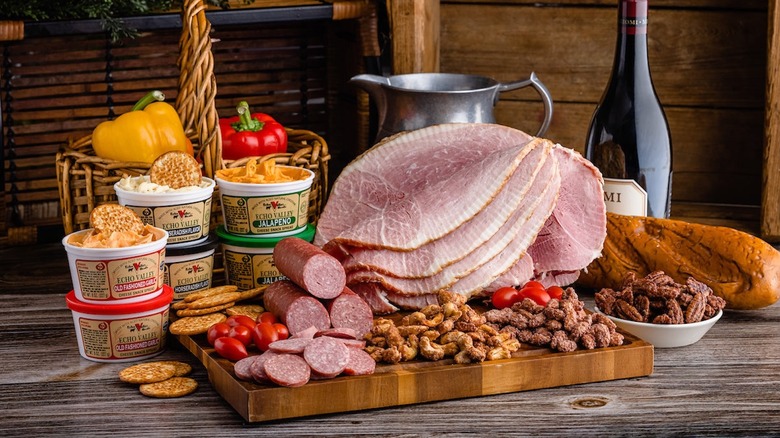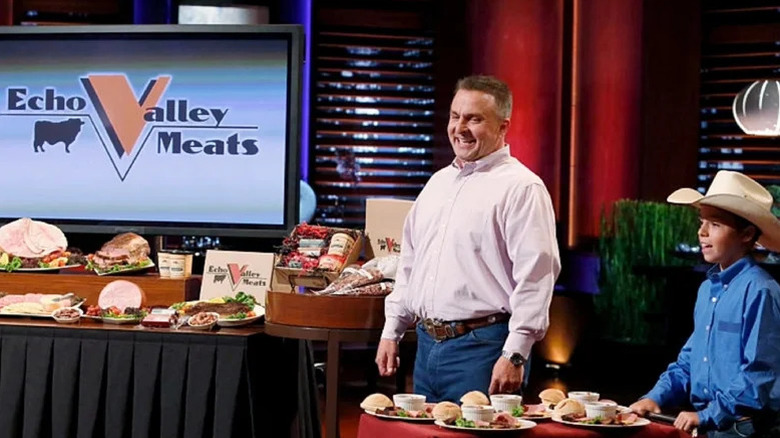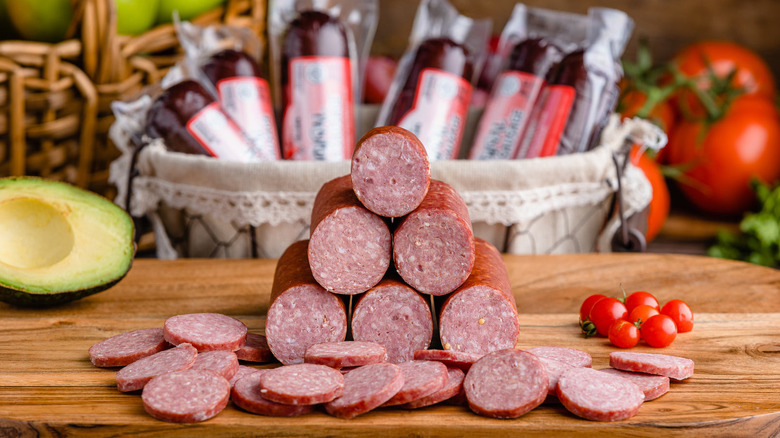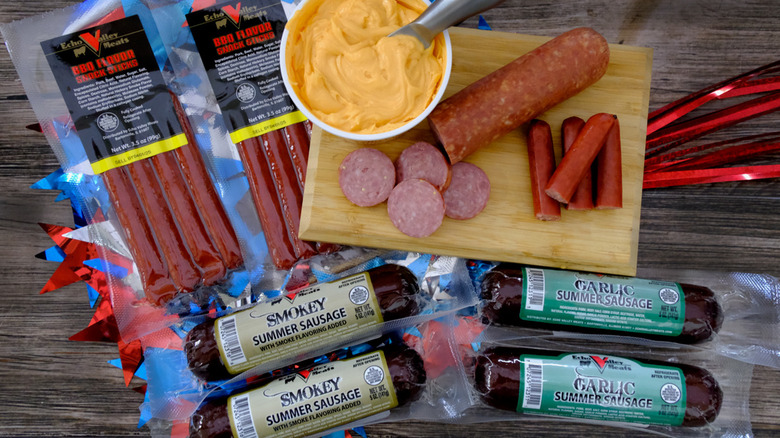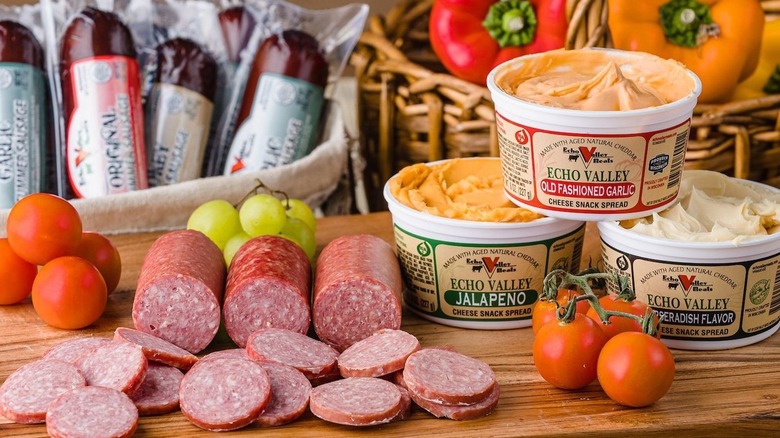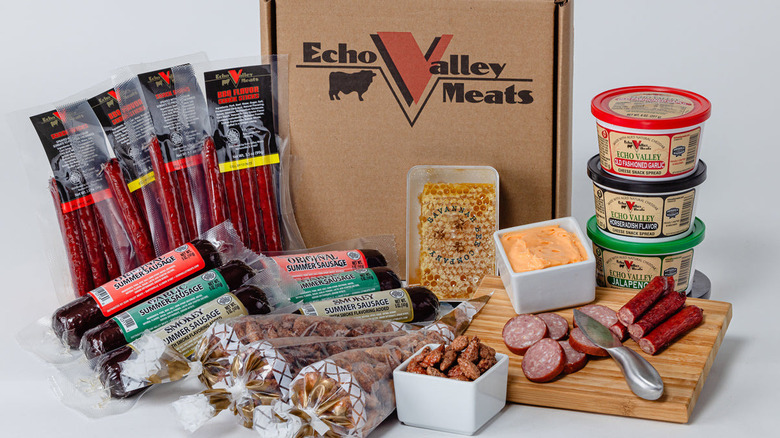Echo Valley Meats: Here's What Happened After Shark Tank
The story of Echo Valley Meats on "Shark Tank" is full of twists, turns, and unexpected endings. The company's founder, Dave Alwan, is a third-generation cattleman and farmer from Peoria, Illinois. Alwan, whose father immigrated from Lebanon, owned and managed multiple farms for 10 years before establishing the family-owned meat market Alwan & Sons Meat Company in 1957.
That passion spread to Alwan, who purchased his first farm when he was just 23 years old. He became so passionate about every aspect of the meat production business that he traveled to Europe to study the art of smoking meat. What was supposed to be a three-year apprenticeship was completed in six months because of his dedication.
In 1998, instead of supplying meat to different distributors, Alwan started Echo Valley Meats with his wife, Dawn. Since its inception, the company has focused on providing gourmet meat to online consumers at an affordable price point. Echo Valley became a core business in Illinois, with Alwan receiving numerous awards and accolades for his success. In 2008, the company won Business Today magazine's Business of the Year award. He could have stopped at being a local legend, but he wanted more — so in 2012, Alwan auditioned for "Shark Tank."
What happened to Echo Valley Meats on Shark Tank?
With decades of industry knowledge and a high-quality product he could stand behind, Dave Alwan appeared on "Shark Tank" in Season 4, Episode 21. Echo Valley Meats was pitched to Robert Herjavec, Mark Cuban, Kevin O'Leary, Lori Greiner, and Daymond John. The Sharks were initially impressed by both Echo Valley Meats' $1.25 million in sales from the previous year and the sample assortment of its most popular products, like its hickory-smoked ham and award-winning summer sausage.
But not even Echo Valley could handle the smoke that was about to come. When Alwan revealed that Echo Valley Meats was selling superior-quality meat for 42% less than competitors, the Sharks grew concerned. After a bit of prying, Alwan revealed that his margins were between 26% and 28% and that, although his sales were impressive, his gross profit was only $20,000 after expenses like a sausage stuffer and a smokehouse. Then O'Leary directly asked if Alwan could name his customer acquisition cost, and the business owner did not know the number. This admission made the Sharks uncomfortable about investing in Echo Valley Meats.
Alwan countered that the $300,000 he was asking for 20% equity would be returned once Echo Valley Meats reached $5 million in annual sales, but the Sharks shuddered at that number. While Cuban enjoyed the product, he felt Alwan came to the pitch unprepared, making him the first to bow out. Quickly, the rest of the Sharks followed, and — similar to what happened when Blondie's Cookies was on "Shark Tank" — Alwan went home without a deal.
Echo Valley Meats after Shark Tank
After his first appearance, Dave Alwan experienced what many call the "Shark Tank effect," with his website traffic skyrocketing from a handful of visits to tens of thousands. On top of the sales surge, a few celebrities reached out to Alwan offering partnerships — some even hoped to buy Echo Valley Meats outright. It's no shock people were after a high-quality, affordable product like Echo Valley Meats, especially considering it carries a great version of the most popular cut of steak in America: ribeye.
The Sharks were so impressed with the product that all of them ordered packages afterward, especially Mark Cuban, who became a huge fan. The team behind "Shark Tank" was so impressed that they flew to the Echo Valley Meats facility in Bartonville, Illinois, to film an update segment. These update segments typically run three to five minutes and highlight what previous entrepreneurs have been up to. The Echo Valley Meats segment aired on October 4, 2013, in Season 5. It went so well that Alwan was invited back — a very rare occurrence — for a second pitch.
Echo Valley Meats' second chance
This time, Dave Alwan came prepared, and it paid off. Remembering that during his initial appearance he couldn't answer Mark Cuban's question about customer acquisition cost, he memorized the numbers. He shared that it cost $12 to acquire a new customer and $1 for a returning one. His gross revenue that year was $1.4 million, and his net profit was $260,000. The Sharks started biting.
Alwan asked for $150,000 in exchange for 20% equity. Kevin O'Leary matched the offer on two conditions: He wanted a stake in both the mail-order and retail sides of the business, and Echo Valley Meats had to carry one of Mr. Wonderful's cupcake brands. Robert Herjavec countered with $300,000 for 35% equity, also wanting a stake in both sides of the company. Not one to lose a deal, O'Leary adjusted his offer, keeping the amount the same but lowering his equity ask to 17.5%.
But Alwan had his eyes on Cuban, who had become the product's biggest fan. Cuban offered $150,000 for 25% equity — 5% more than Alwan had initially offered. In addition to the equity, Cuban requested the option to purchase 25% of the retail side as well. Delighted that a Shark felt as passionate about the product as he did, Alwan accepted Cuban's offer and, after two tries, finally left with a deal.
Is Echo Valley Meats still in business?
After his second appearance, Mark Cuban used his influence to take Echo Valley Meats to new heights. "Mark's family on multiple levels are all customers," Dave Alwan told Tasting Table in an exclusive interview. "I couldn't ask for anything better."
Alwan also revealed that Cuban even called into QVC to offer his full-throated endorsement. It's clear Cuban is not just financially invested in Echo Valley Meats' success, but emotionally invested as well. But Cuban isn't the only Shark who's done business with Dave Alwan. Despite rejecting Kevin O'Leary's offer on-air, Alwan later partnered with another company O'Leary invested in on "Shark Tank" — the glass-jarred Wicked Good Cupcakes — for a successful run.
Echo Valley Meats also partnered with Yeti Coolers, allowing customers to order coolers packed with gourmet summer sausage, crackers, and cheese spreads. These partnerships have fueled incredible success for the company. Not only is Echo Valley Meats still in business — it's thriving. One Redditor wrote the products are "dang good quality, nothing fancy like wagyu or organic grass-fed but still really high quality," adding that they would "definitely" repurchase.
What's next for Echo Valley Meats?
As for what's next, it seems like Echo Valley Meats will be expanding beyond just cheese spreads and meat packages. The company now offers chocolate-covered nuts, and the next frontier the company is exploring is its in-person retail space. In March 2025, Echo Valley Meats opened a daily lunch grill. The offerings cannot be shipped and are available for local pick-up customers only. However, lucky fans in the area can purchase items like hot dogs, barbecue pork, and smoked beef brisket.
Soon after, the lunch spot expanded into an early morning café offering breakfast sandwiches, coffee drinks, and donuts from the Illinois family-owned chain Mel-O-Cream Donuts. There are even options for kids, including chocolate milk and Welch's juice. The story of Echo Valley Meats shows how much perseverance, family support, and hard work can lead to success — even if there are some hiccups along the way.
Static Media owns and operates Food Republic and Tasting Table.

